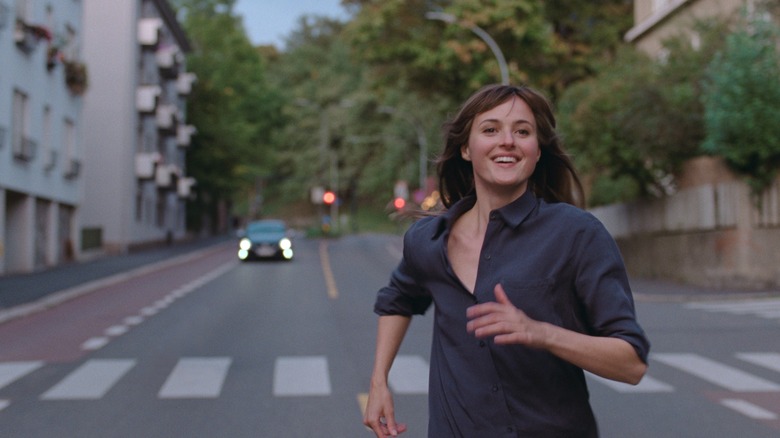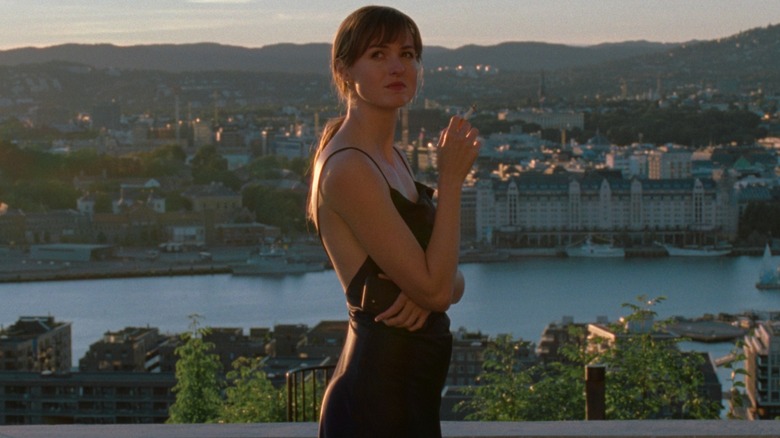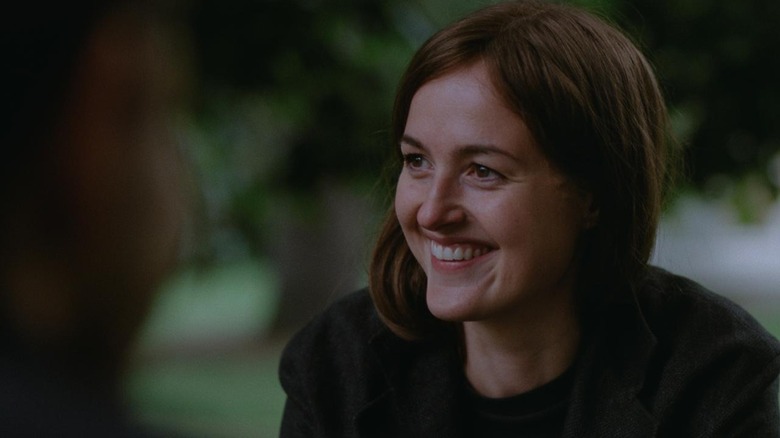How The Worst Person In The World Changed Actor Renate Reinsve [Interview]
Renate Reinsve is electrifying in director Joachim Trier's highly acclaimed new feature film "The Worst Person of the World." Just like the movie itself, her performance is vibrant, full of life, and runs a gamut of experiences and emotions. Reinsve laughs about how the role of Julie was written for her, but based on her wide-ranging performance, it seemed like it had to be. For most lead performances, audiences can imagine an alternate reality in which another actor got the role instead, but that's not the case here. Only one person could have starred in "The Worst Person in the World."
It's a role that's changed Reinsve — not only as an actor but, as she explained to us, as a person. Previously, she had a small part in Trier's "Oslo, August 31st," and her co-star spoke fondly of her work in that movie. "We saw her talent and wanted to work with her again, or Joachim wanted to do that," Anders Danielsen Lie told us. "She's just a very generous and creative actor. And when you have colleagues like that, my job gets pretty easy." She's also very easy to interview, based on our recent conversation with her about her profound experience making "The Worst Person in the World."
"We're there in the moment."
How's it been talking about this movie? I ask because there's so much a person could takeaway from it.
Yeah, because everyone also has such a personal relationship to the movie and they see themselves so much. Which is great, which is what we want. It's an endless well of conversation about love and life. It's funny because I had one person in a Q&A, we did a Lincoln Center screening and he asked me, "How do I fix my life?" I said therapy. And I met him now, two days ago. He was in the screening, in Lincoln Center again. And he said, "I started therapy."
Oh, great.
[Laughs] Yeah. So funny. I loved being on set with this movie just because I was surrounded by these themes and these questions. I had great people to talk about it with, my co-actors and the crew, and so many wonderful people. I have great questions that I don't know the answer to, but it's great conversation all the way.
From the beginning, what were some of your questions when you first read the script?
My questions were ... I didn't know really how to do this role because she was so complex, and that's very rare. Usually, it's very clear who she is and what's the function of that role, and the script is more plot-driven. [This] script really, really struck me, but I was unsure of how to navigate within it. And then I had these great conversation with Anders and he had the same experience. We said, "Okay, so it's not about the characters in the same way we're used to. It's about the dynamic between the characters, and that's going to be the most important thing." So we've really built a lot of trust, we went on trips and we had these games where we would say what we were most ashamed of in life. So that we would get really close to each other. We kind of just let ourselves go into the themes of the script on set and ask questions. We're there in the moment. But that was my first question, "How do I do this?"
The role was written for you, right?
Yeah, yeah.
Was one of your questions for Joachim, "What qualities are you looking for that made you think of me for this role?"
"What do you think I am?" [Laughs] No, I was really flattered because I love that character. I think Joachim didn't take only from me, but it's that sense of not accepting yourself, not being really comfortable in being yourself all the time. And then trying also to take choices from something exterior and not really staying in those uncomfortable feelings or taking what you want really seriously. You have to be kind of forced into the opposite, to take choices from what actually makes you happy. And the only way to be forced into that state is going through some big losses and some big chaotic periods, where you resign and lose everything. I think that's very true, and I know Joachim knew that I had been through a lot of big existential turnovers. Is that a word even? [Laughs]
[Laughs] I think so. It works.
Yeah, you understand what I mean. And really, I had, on the other side, found more just acceptance in being myself. I could kind of rest in myself. So, yeah, that's probably the first big things I took from it.
It's great to watch Julie's growth in that sense, like in the breakup scene where she very clearly expresses herself.
Yeah. I really fought for her to be a strong character in the sense that — Askel felt he was more strong in that relationship because he could put things into words and analyze things. He's very sure of what he wanted, but I wanted her chaotic state of mind to be a strong place to be, because that's where you have to start. You have to be really vulnerable and really search, and be in that uncomfortable place to even start knowing who you are and what to do in life.
"Stop time and live through something that we have in our minds."
There are so many lines this movie that strike such a deep chord, like when Julie says she feels like a supporting character in her own life.
Yeah.
What lines really resonated with you?
Well, I had the line where she says, "You are so strong all the time because you know exactly what to do and what to say. But it should be a strong place to be, to just feel and just be in the chaos." I think it's something like that. That's just something that happened, that I improvised in that moment. Because I was provoked by the way Aksel was being so sure that he was right in that argument, so that was an important perspective for me. I really also loved the line that Aksel says in the hospital, where he says, "I was always afraid of stuff going wrong, but the stuff that went wrong was never the stuff I was afraid of." I really, really love that one.
Very truthful. I know you improvised a bit of the breakup scene, but another scene that changed a bit was the mushroom trip. There are moments you miss from that sequence that got cut, right? What were they?
She has all of her exes from her whole life stand in a circle. She goes over and talks to them. Even just a look or a small conversation about what went wrong and why did it go the way it did? She taps into the chemistry that they had. There were a lot of guys, more than you see in the movie [Laughs]. And she was even more brutal with confronting her father in what's been taken out. It was more confronting of the father. That's what I remember that was taken out.
What about the sequence where time stops? How'd you interpret it?
Well, I think that's something we all wish could happen. Stop time and live through something that we have in our minds. Or stop time and choose something, and go back, and choose something else. That's where she's at existentially. She wants it all. She wants to have, in her dream life, she could have that experience with Elvind and also be with Aksel at the same time, but you can't. So it's kind of, I guess, the kind of intuitive, the animal of her. What you want to do, the raw lust of stuff, and that's all the wrong words, but it's the essence of it. You have to also live in society and do what are expected of you, and that contrast between those things is really a battle, in that scene.
What has been most fulfilling about this experience for you? What really fills you with a sense of pride?
I think going into a project where we [were all surrounded] with those questions. And working with a director that really wants to explore the human condition in the time we live in or human relationships and love in a really deep, existential manner. I'm really proud to be a part of it, because I have always gone there in my own mind. I love doing that, but I've grown up in a very small place where that was a bit, I guess, shameful and I was looked at a bit weird for wanting to always go there with stuff that I did. I was really fighting for that — that was a right thing to do.
I feel also in Norway, it's a lot of commercial stuff that wins through. A lot of movies that are commercial, who people go to see and that are more popular. But in Joachim, we had a great collaboration because we feel that, that state of mind and asking those questions are so important. We kind of played off of each other in that and everyone he brought into the production really were like that. I'm so proud that we were right in a way, or that it also has been important to other people. I'm just really, really happy because I feel that it's so important.
"The Worst Person in the World" is now playing in select theaters.


